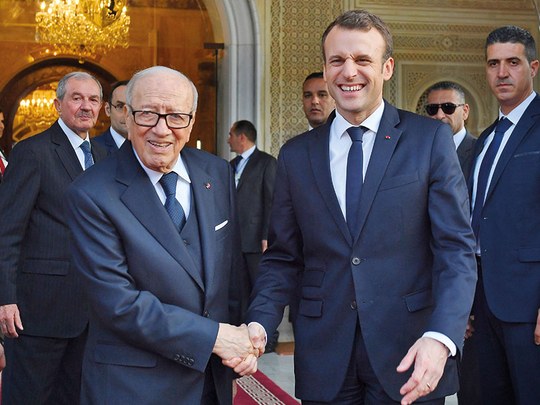
Tunis: France said on Wednesday it would provide Tunisia with more than €272 million ($338 million, Dh1,240 million) in new financing as it seeks to bolster the North African nation’s democratic transition.
The support, announced during a visit to Tunis by French President Emmanuel Macron, includes €177 million in loans for state sector reform and urban development, and €50 million in aid for the digital economy.
It also includes the conversion of €30 million of debt into development projects and a €15 million credit line for small and medium-sized businesses.
Tunisia has been held up as the only democratic success story in the region after an uprising in 2011 that launched the Arab Spring, but its transition has been undercut by deep economic problems that have fuelled unrest.
Earlier this month protests erupted across the country after the government, under pressure from international lenders, implemented price and tax hikes to shrink the deficit.
“I will state it very clearly,” Macron told reporters after meeting Tunisian President Beji Qaid Al Sebsi. “Tunisia’s success in defending its values — democratic, of freedom of conscience, of equality between men and women — is our battle as well.” “It’s not aid that France is bringing Tunisia, it’s a task that we need to undertake together. If you fail, we will fail the next day or the day after.” France had already pledged to provide Tunisia with €1.2 billion in aid from 2016 to 2020, a commitment that Macron reaffirmed at the start of his two-day state visit.
France intended to provide a further €500 million of support for the period 2020-2022, he said.
The international community has pledged extensive financial credit in recent years, but Tunisia has struggled to absorb the money, create new jobs, and develop its marginalised interior.
High levels of youth unemployment have fuelled periodic bouts of unrest. During the protests this month, some of which turned violent, police arrested more than 900 people, raising concern from rights groups.
Al Sebsi, speaking alongside Macron, defended the actions of the security forces.
“Tunisia is a democratic country,” he said. “These rioters, we pursue them because we have achievements to defend, but I guarantee to you that not a single arrest was made without the opinion of the state prosecutor.
“I won’t say that our justice system is the best in the world, but it works.”












